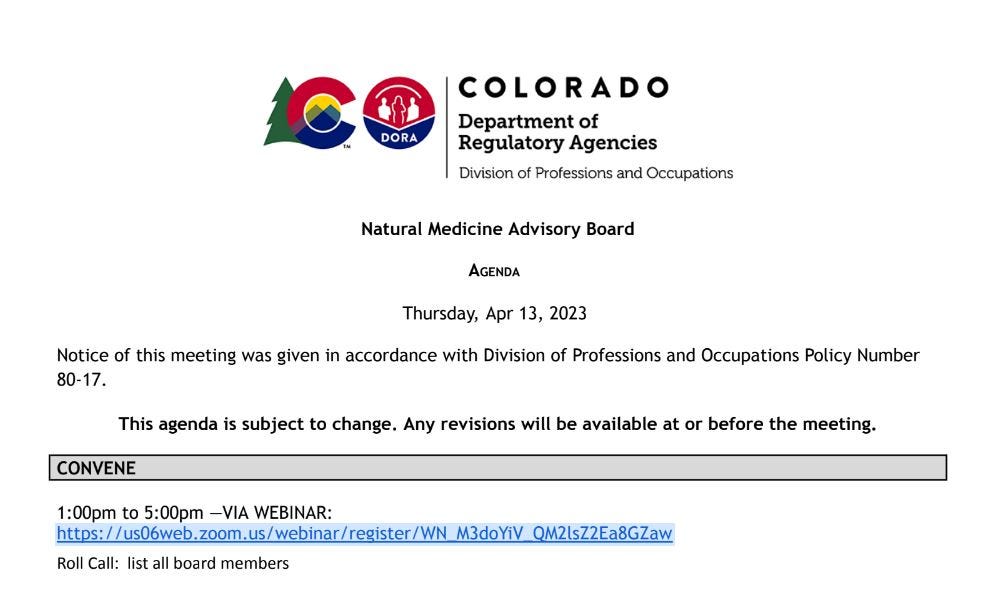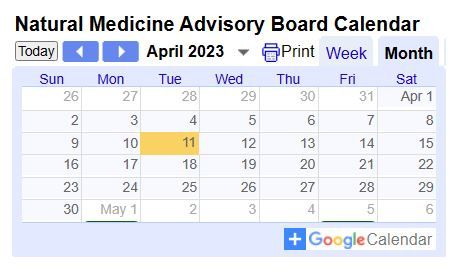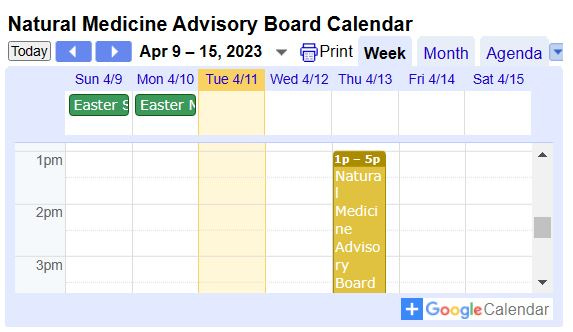What to Expect from First Psychedelic Meeting of Colorado's Natural Medicine Advisory Board
The state's psychedelic advisory board meets on Thursday, April 13 from 1 - 5pm Mountain Time. It will discuss subcommittees, bylaws, confidentiality, and conflicts of interest
Colorado’s Natural Medicine Advisory Board (the “Board”) will hold its first meeting this Thursday from 1 - 5pm Mountain Time. The public can join the Zoom meeting and view the agenda.
The board will make recommendations to the Department of Regulatory Agencies (DORA) on rules for implementing the Natural Medicine Health Act, which Colorado voters approved as Proposition 122 in November. I’ll summarize what viewers can expect from tomorrow’s meeting. But first I’ll discuss DORA’s handling of meeting logistics.
Information regarding the meeting was supposed to be published on the Board’s website. However, as of today at noon Mountain time, the details had not been posted clearly nor distributed to the Board’s email list. The most recent email notification, sent on March 30th, first announced the upcoming meeting but provided no details.
Yesterday, David Nadelson (@torrential2), an interested citizen and unaffiliated volunteer lobbyist, provided Psychedelic Week with a Google Drive link that contains the meeting agenda.
To access the agenda and the meeting Zoom link, visitors to the Board website must scroll down and view a small Google Calendar in the bottom right-hand corner of the site.
After clicking “week” in the upper right-hand corner of the calendar, visitors will see the Board meeting in gold. They can then click the meeting, which appears as a gold-colored column, to access the Google Drive link.
According to the agenda: “Notice of this meeting was given in accordance with Division of Professions and Occupations Policy Number 80-17.” However, to ensure the public is aware of these meetings, and given a fair opportunity to attend, the Department of Regulatory Affairs (DORA) should post the information clearly on its website and provide details to those who signed up for email updates.
Over the past two years, Oregon went through a similar rulemaking process to implement the Oregon Psilocybin Services Act (Measure 109). The Oregon Health Authority (OHA) did an admirable job keeping the public apprised of meetings of the Oregon Psilocybin Advisory Board. OHA’s website clearly lists meetings dates. It also contains relevant documents and audio recordings of all prior board meetings.
Regarding Colorado’s Board, one might overlook the difficulty of accessing meeting information if it was an isolated problem. However, since the Board was appointed, information regarding its activities has been scarce and difficult to access.
After being appointed in January, the Board went silent for months. By comparison, Oregon’s board convened two weeks after being appointed. Unlike Oregon’s board, Colorado’s had to be confirmed by the state Senate.
Despite frequent inquiries from Colorado activists regarding the confirmation date, confirmation occurred with seemingly little or no notice. Instead of taking place in a Senate committee associated with DORA, which houses and oversees the Board, the first of two confirmation hearings occurred in a committee associated with the Department of Revenue. The unexpected venue threw local activists off, and few if any were aware the event had occurred. Psychedelic Week learned of the Board’s confirmation the following week by writing to Senate President Steve Fenberg’s office.
What should the public expect from tomorrow’s meeting? As the Board’s first public appearance, the meeting will contain many formalities. According to the agenda, after Board members are introduced, the first order of business is reviewing state laws regarding open records, open meetings, ethics, and conflicts of interest.
Board members likely received this information earlier. According to DORA spokesperson Katie O‘Donnell, the Board was undergoing training prior to its first meeting. However, it will be useful for the public to hear this legal information alongside Board members.
Following the review of state laws, the Board will view a presentation on its mission and scope. The agenda does not indicate who will lead this presentation. But I would not be surprised to see lobbyists from the Healing Advocacy Fund (HAF) making a guest appearance.
In Oregon, the HAF worked closely with the OHA and the Governor’s office to influence rulemaking for the Oregon Psilocybin Services Act. The HAF also made a guest appearance at a meeting of the Washington State Psilocybin Work Group.
According to records obtained by Jimmy Smrz of Psych4, the HAF met privately with DORA officials, and staff from Governor Jared Polis’s office, nine days after voters approved the Natural Medicine Health Act in November. The lobbying firm has met privately with state officials at least seven other times since then (on what seems to be a twice monthly basis).
Scheduling these meetings appears to be the responsibility of Denver attorney Joshua Kappel, a senior advisory to HAF, and DORA’s Sam Bahrami, senior advisor to the agency on natural medicine services. There is little public information about Bahrami, but as of last year, he served as “Director of Advance and Travel Press Secretary” for Governor Polis.
After tomorrow’s presentation on the Board’s mission and scope, the group will create subcommittees to which much of its heavy lifting will likely be delegated. It is unknown which subcommittees will be formed. However, the signup form for Board email notifications provides some clues. Receiving notifications requires visitors to provide DORA with information regarding their qualifications related to psychedelics.

In Oregon, the Psilocybin Advisory Board created subcommittees focused on health equity, research, products, licensing, and training. Colorado’s Board may form similar committees. However, they would be wise to create committees focused on ethics and Indigenous use of psychedelics. These subcommittees were proposed in Oregon but were never established.
One of the most interesting items on tomorrow’s agenda is an “attestation of board matter confidentiality.” The agenda provides few details, but the line item includes a question that asks: “Do you attest and affirm that all conflicts of interest have been disclosed and that confidentiality of all board matters has been maintained since the previous board meeting?”
This agenda item is notable because Oregon’s board had significant problems with board member conflicts of interest. Board chair Tom Eckert founded his training company almost immediately after the board was appointed. While serving as board chair, he led the training subcommittee that drafted rules for his training company. When reporters learned that Eckert was dating Rachel Aidan, CEO of the Synthesis Institute, board members pressed for public disclosure of conflicts of interest (at the time, Synthesis was one of the largest companies planning to do business in Oregon. It has since gone bankrupt). Eckert resigned shortly before board members were scheduled to disclose their conflicts.
There were other potentially worrisome conflicts in Oregon. Board member Todd Korthuis met secretly with OHA officials and lobbyists at HAF to undermine the board’s recommendations on data protection. Further, the chair of the products subcommittee, Jesse Uehling, failed to disclose that she founded a company called Psilogen. When asked about the company during a board meeting, Uehling said it had nothing to do with producing psilocybin.
A fourth board member, Steph Barss, took a position with psychedelic training company Fluence while serving on Oregon’s training subcommittee. However, Bars appears to have made a timely disclosure of this conflict.
Given Oregon’s history with conflicts of interest, one might wonder whether Colorado’s board will be more transparent and proactive. From the meeting announcement, it is unclear whether Board members will declare their conflicts publicly. The relevant agenda item appears after a heading titled “Executive Session.” So, it’s possible this portion of the meeting might occur behind closed doors. That would be unfortunate because the public deserves to know what conflicts public officials have.
It also remains unclear what would constitute an unacceptable conflict of interest. Should Board members be permitted to start businesses that benefit from regulations they create? The Board’s composition has already generated controversy. Colorado psychedelic communities feel they are not adequately represented, and the Governor’s office forbade Board member’s from speaking with the press.
One notable omission from the meeting agenda is an opportunity for public comment. Though Oregon’s board often left little time for the public to address board members, a public comment session was almost always included as the final agenda item. If DORA and the Colorado Board wish to be transparent and accountable, they should make time for the public to participate at meetings.
According to the agenda, the date of the next meeting will be determined tomorrow. Stay tuned for more coverage of the Board’s activities from Psychedelic Week.
*The views expressed on Psychedelic Week do not represent the views of POPLAR at the Petrie-Flom Center at Harvard Law School or the Florida State University College of Law. Psychedelic Week is an independent project unaffiliated with these programs and institutions.
Mason Marks, MD, JD is the Florida Bar Health Law Section Professor at the Florida State University College of Law. He is the senior fellow and project lead of the Project on Psychedelics Law and Regulation (POPLAR) at the Petrie-Flom Center at Harvard Law School and an affiliated fellow at the Information Society Project at Yale Law School. Marks teaches drug law, psychedelic law, constitutional law, and administrative law. Before moving to Florida, he served on the Oregon Psilocybin Advisory Board where he chaired its Licensing Subcommittee. Marks has drafted drug policies for state and local lawmakers. His forthcoming book on psychedelic law and politics will be published by Yale University Press. He tweets at @MasonMarksMD and @PsychedelicWeek.








Great summary, Mason - yours was the easiest way to find this information. Despite being signed up for notifications, I had to do this same digging to find the info. Thanks!!